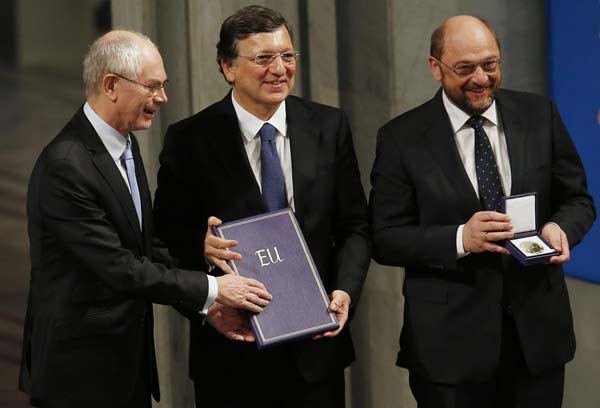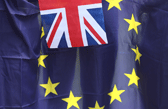EU picks up controversial Nobel peace prize
(Xinhua) Updated: 2012-12-11 04:26OSLO - The European Union on Monday picked up the controversial 2012 Nobel peace prize at a prize-giving ceremony held at the Oslo City Hall.
 |
|
European Union (EU) representatives, President of the European Council Herman Van Rompuy (L), President of the European Commission Jose Manuel Barroso (C) and President of the European Parliament Martin Schulz hold the Nobel Peace Prize after they accepted it on behalf of the EU during a ceremony at City Hall in Oslo December 10, 2012. [Photo/Agencies] |
European Commission President Jose Manuel Barroso, European Council President Herman Van Rompuy and European Parliament President Martin Schultz, who acted on behalf of the EU, received the diploma and medal from Thorbjoern Jagland, chairman of the Norwegian Nobel Committee.
German Chancellor Angela Merkel, French President Francois Hollande and leaders of some other EU member countries attended Monday's ceremony.
In his speech, Jagland defended the decision to award the EU with this year's Nobel peace prize, saying that the EU has in fact helped to bring about both the "fraternity between nations" and the "promotion of peace congresses" of which Alfred Nobel wrote in his will.
The Nobel peace prizes have caused a lot of controversies over the past few years.
But unlike what happened in the previous years, the Nobel peace prize to the EU this year raised the dust in Norway of a long existing strong sentiment among a large portion of Norwegians, who are against Norway joining the regional bloc.
Among them is a movement spearheaded by the group known as Nei til EU, literally meaning "No to EU."
The Nei til EU organization called and organized a rally and candlelight procession in downtown Oslo on Sunday afternoon in a protest against giving the prize to the EU.
Ministers from the Centre Party, a partner of the current coalition government in Norway, even threatened to boycott the ceremony because of the party's stand of opposing any Norwegian effort in seeking a possible EU membership.
Norway has long been divided over the issue since it said no to joining the EU in two referendums held respectively in 1972 and in 1994.
Meanwhile, some organizations chose to hold a torchlight march, showing support to the Nobel peace prize for the EU and "celebrating the EU as one of the world's most successful peace projects."







